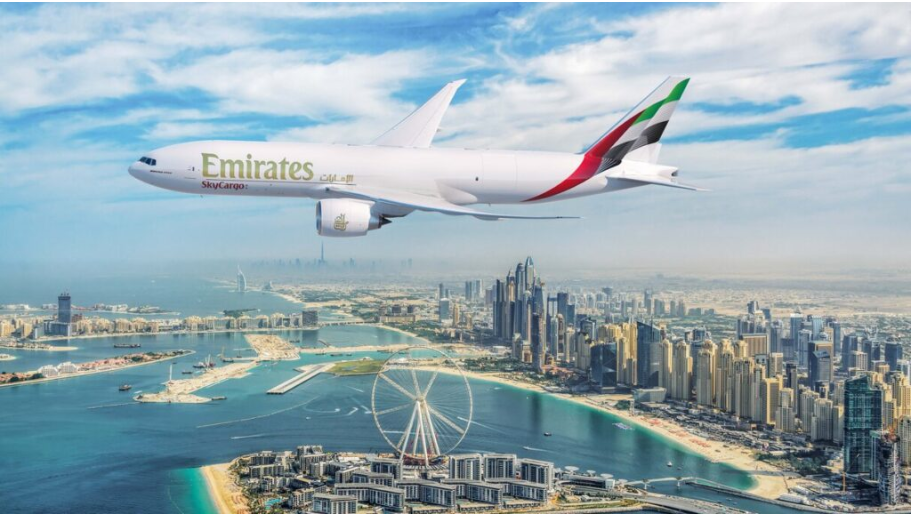
Emirates is significantly expanding its cargo operations with a strategic new order for 5 Boeing 777F freighters. Delivery of the new acquisitions is scheduled for 2025/2026. This latest purchase brings the airline’s total pending 777F freighter deliveries to 14 aircraft through late 2026. This represents a substantial investment for the carrier’s freight capacity. in conjunction with the new purchase, the Dubai-based carrier has simultaneously strengthened its existing fleet arrangements. Emirates has also renewed lease agreements with Dubai Aerospace Enterprise for 4 Boeing 777Fs currently in service.
These strategic moves will help Emirates SkyCargo grow its dedicated freighter fleet from 11 to 21 aircraft by December 2026. This will nearly double its current cargo capabilities.In a parallel initiative to bolster its freight operations, Emirates continues its ambitious program to convert 10 Boeing 777-3 00ER passenger aircraft into freighters. This conversion project further highlights the airline’s focus on the burgeoning cargo sector, and the positioning of Dubai as a key hub.
HH Sheikh Ahmed bin Saeed Al Maktoum, Emirates Airline and Group Chairman and Chief Executive offered comment on the initiative. We’re investing in new freighter aircraft to meet growing demand and enhance our global service offerings, he said.
The surge in Emirates’ cargo services highlights Dubai’s emergence as a trusted logistics hub and validates our tailored shipping solutions across various industries. Our expansion strategy reflects our confidence in the future of global trade and Dubai’s central role in facilitating it.
Stephanie Pope, Boeing Commercial Airplanes’ president and CEO, was confident about the partnership’s ability to meet these goals. Emirates leads the industry, and we’re honored by their continued trust in Boeing’s widebody aircraft as the foundation of their global fleet.The Boeing 777F Freighter’s performance and versatility will support Emirates SkyCargo’s mission to connect markets worldwide, offering unparalleled efficiency and reliability.

Emirates will continue leveraging its extensive passenger fleet of 777s, A350s, and A380s alongside the dedicated freighters to ensure efficient cargo movement globally. This mixed fleet approach offers customers enhanced flexibility and connectivity, allowing the airline to optimize cargo capacity across its vast network of destinations.
The fleet expansion also aligns with Dubai’s ambitious plans for Al Maktoum International Airport (DWC). Set to become the world’s largest aviation hub, DWC will eventually handle an impressive 12 million tonnes of cargo annually.
This massive capacity will support the adjacent Logistics District’s development as a global shipping center. This will further reinforce Dubai’s position as a crucial multi-modal transportation hub connecting air, sea, and land routes.
Looking ahead to the future, Emirates plans to finalize its 2028/29 freighter fleet strategy by year-end. The airline is carefully evaluating both the Boeing 777-8F and Airbus A350-1000F as potential options for its next generation of cargo aircraft. The aim is to ensure its fleet remains at the forefront of efficiency and technological advancement in the air cargo industry.
This comprehensive investment in cargo capabilities positions Emirates to meet currently growing global demand for air freight services. Nationally, it also further strengthens Dubai’s role as a pivotal international logistics hub.


